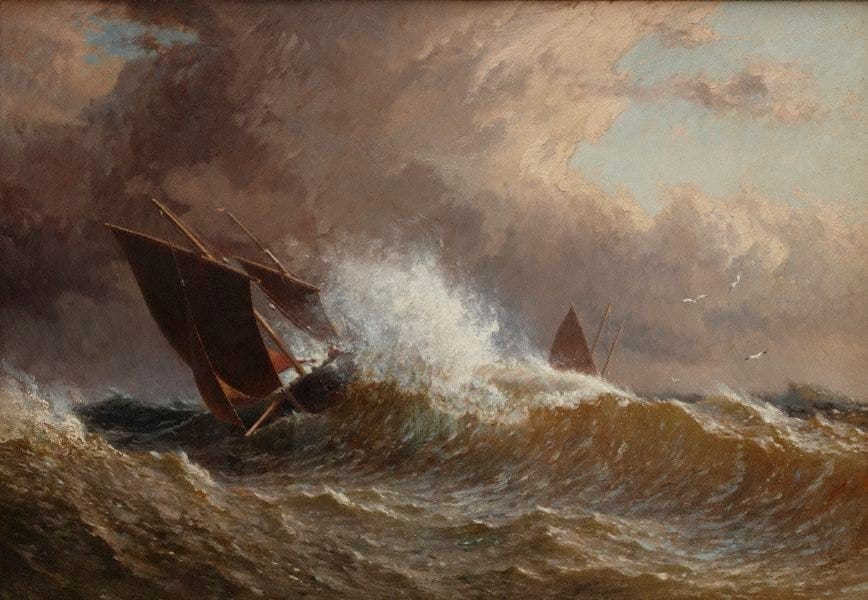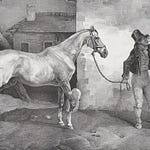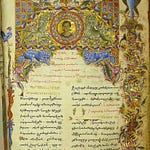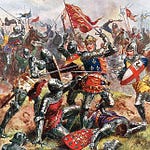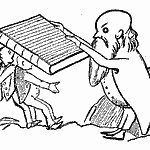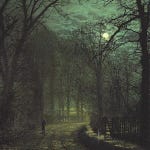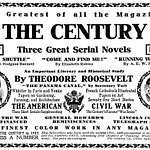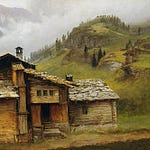It’s evening, in the fall of 1892, and an old man with a very long beard is lying on his bed. He is Alfred Tennyson, the most famous poet in England, and he is dying. His elder son Hallam is at his bedside. He had named the boy Hallam after his dearest friend in the world, his college classmate Arthur Henry Hallam. Arthur was a poet too, and had fallen in love with the old man’s sister, and they were to be married. But Arthur died suddenly of a cerebral hemorrhage, and that shook Tennyson’s faith to the core. He fought manfully against doubt and despair, and he emerged from it with a faith in God, but not what you’d call an orthodox faith, and what he believed about Christ, whom he considered to be the greatest and holiest man who ever lived, is not clear to me.
“Hallam,” he says, “I want you to promise me that you tell all the publishers what they must do if they are going to print any collection of my poems. ‘Crossing the Bar’ has to come last. It doesn’t matter that I wrote a couple of poems after it. ‘Crossing the Bar’ comes last. Don’t let them bully you out of it.”
“I’m sure they will respect your wishes, Father,” says Hallam, forty years old and a powerful man of the world in his own right. “But I will make sure of it, just as you say.”
Why did Tennyson insist upon it?
Our Poem of the Week is one I first read when I was in high school, and I loved it, as I’ve loved pretty much everything that Alfred Tennyson ever wrote. “Crossing the Bar” is a small masterpiece of music and meaning that are so completely in harmony, you hardly notice that there’s any art to it at all. It feels as natural and ordinary as is the tide it describes, gently retreating back to the deep blue sea. But it is also the last, that is the consummate, prayer of a man who struggled, as so many of the Victorian poets did, with a host of new ideas about the world, ideas that seemed to shake the pillars of the faith — for it was not Darwin but Tennyson who described the new and harsh vision of Nature as “red in tooth and claw,” and it was not any modern nihilist but Tennyson who described passing by his friend’s old house one gray and rainy morning, and no one was there, as “on the bald street breaks the blank day.” Yet he did not despair. He did not give up.
The poem is a tissue of alternating long and short lines, with alternating rhymes, like the strong and soft beat of the heart, or the flow and ebb of the tide, or the surge of youth and the slow retreat of old age. We have four stanzas, the first and third with one metrical pattern, the second and fourth with another pattern, similar but fuller, suggesting both ease and final strength. The idea behind the poem is simple. When you cross the “bar,” that is, the sandbar that shields the bay from the mighty waves of the open ocean, you may hear the “moaning” of the waters as they wash over it, if the tide is at a low level. But if the tide is high, and the weather is good, then the waters will be full and calm, and you will not notice the sandbar beneath. Let my farewell be like that, says Tennyson. And let it be so, not because he believes he is being resolved into lifeless matter, but because — and here the man of faith gets up from that bed and stands tall — he hopes to meet his Pilot, as he recalls the words of Saint Paul: “For now we see as in a glass, darkly; but then, face to face.”
Sunset and evening star,
And one clear call for me!
And may there be no moaning of the bar,
When I put out to sea,
But such a tide as moving seems asleep,
Too full for sound and foam,
When that which drew from out the boundless deep
Turns again home.
Twilight and evening bell,
And after that the dark!
And may there be no sadness of farewell,
When I embark;
For tho' from out our bourne of Time and Place
The flood may bear me far,
I hope to see my Pilot face to face
When I have crost the bar.Use the discount button below to upgrade to paid or give a gift subscription at a 20% off through October 31st.
Word & Song by Anthony Esolen is an online magazine devoted to reclaiming the good, the beautiful, and the true. We publish six essays each week, on words, classic hymn, poems, films, and popular songs, as well a weekly podcast, alternately Poetry Aloud or Anthony Esolen Speaks. To support this project, please join us as a free or paid subscriber. Learn more about our subscription tiers by clicking the button below.


